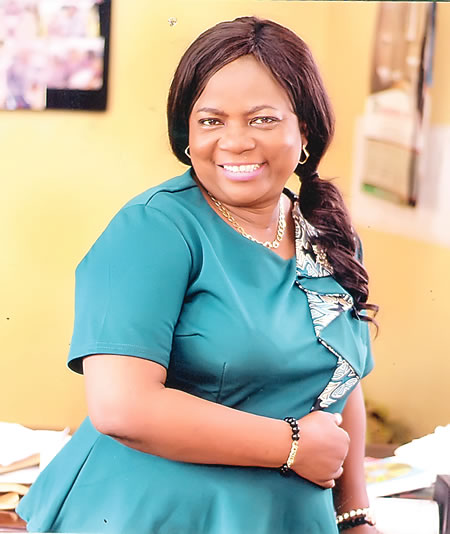WHY did you decide to go into broadcasting?
I stumbled into the profession. As a matter of fact, I have always wanted to be a medical doctor hence the reason I studied Sciences when I was in secondary school but you see “man proposes, God disposes.” I met my husband who was a broadcaster and he just thought I had all it takes to be a broadcaster. So he brought me to Radio Nigeria for an audition which I passed and that was how I reluctantly joined him in the profession. Thereafter, I started watching the likes of Sienna Allwell Brown and Ruth Benemesia Opia, those were the people I was actually trying to fashion my career as a broadcaster after and to God be the glory, here I am today.
How has the journey been so far?
The journey has been very tedious. When I came on board as an announcer, I started as a Yoruba presenter that was in Radio 2, thereafter I was sent to the training school in Lagos where I started on a professional level and went for my basic presentation course in 1988. Haven’t done that. I came back and seeing the improvement in my presentation, I was taken to Radio 1 where we broadcast mainly in English Language. I was, until some of my senior colleagues at the headquarters discovered my talent and invited me to Abuja for the network news. This I did for sixteen years, shuttling from Ibadan to Abuja, Ado-Ekiti to Abuja and after a while, I was also appointed as the general manager of one of our new stations; Progress FM, Ado-Ekiti. So I was sent there to pioneer the station. Getting to Ado-Ekiti I had to stop reading network news at Abuja. I was in Ado-Ekiti as the general manager of Progress FM 100.5. That was during the first term of Ayo Fayose and with all the troubles then, I was in the heat of that trouble. I spent four years in Ado-Ekiti; it was very beautiful and challenging. From there, I was transferred to Gold FM , IIlesa where I spent a year but it was a beautiful and memorable year for me. I left Gold FM 2007 in 2008 for Ibadan where I was made the General Manager of Premier FM where I spent six years. In 2014, I got promoted as the Assistant Director Programmess here at Radio Nigeria FM and last year I again promoted to the position of Deputy director of programmes, the position I occupied till date.
What is your duty as a Deputy Director of programmes?
My duty as the deputy director of programmes is to supervise and design content for all the stations in the south west. I am also to ensure that all the programmes that we broadcast on the south west platform of Radio Nigeria complied with the set down rules and regulations of the NBC. I also train our staff.
While you were going from Ibadan to Abuja, Ekiti to Abuja, how were you able to ensure that the home front did not suffer?
The home front was well taken care of because when I was leaving Ibadan for Abuja, I took my children along with me. Also, at that point; my husband was transferred to Ilesa so the distance wasn’t much. We could always find time to be with one another. He either comes to Ado Ekiti or I go to Ilesa and the children were in school so there wasn’t much problem and once you know your position as a wife and your responsibility as a mother, I don’t think there would be any problem and those were my guiding principles then. I know that as a wife, I have some responsibilities I must take care of. First and foremost, I am expected to take care of my husband and my children and ensure that my work didn’t affect that.
What was the most defining moment of your career?
The most defining moment of my career was when I went to Ado-Ekiti. I was a middle management staff of Radio Nigeria and for the management to have discovered my talent and my managerial ability, that was actually a plus for me. One would have expected that a position like that should have gone to a level 15 or 16 officer not someone on level 12. Going there was like learning new things, having to work so hard for people to actually know that what a man can do a woman can do it not better was quite defining for me.
What price would you say you paid to be where you are today?
Well, if there is any price I paid, it was having to leave my home to sleep outside of the town where I worked especially when I was in Ado-Ekiti because of the political crises there at the time. We were in the eye of the storms. As a radio station belonging to federal government and politicians ruling the party were claiming they brought the station to Ado-Ekiti. So it wasn’t easy for me then as a woman. There were times I was scared of people invading my privacy or coming into my house to molest me for one reason or the other, so most times, I had to leave the comfort of my home to hang out with my friends in Akure or even within town without people knowing where I was. I also had to move my family from the flat we occupied to a hotel so they wouldn’t get hurt.
Despite the fact that there are many stations in Nigeria today, the quality and content of many television and radio stations has dropped drastically. What do you think is responsible for this?
Well, what I will tell you is that at Radio Nigeria; if you are coming on board as a broadcaster, it is important for you to obtain training at our broadcast school in Lagos, I know there are short term courses that you are also exposed to there . Any station that wants to come on air, must ensure that the standard is obtained by first ensuring that the workforce is well trained because training is the key. Talking about broadcasters faking their accents, anybody can fake accent but the most important thing is that those who know what broadcasting is will always identify the right channel to listen to. At Radio Nigeria, we train our members regularly.
In Nigeria today, people believe that women who are in the media are promiscuous, what do you have to say about this?
‘When you are in the media, it is like sharing the same platform with men.’ When I wanted to come into broadcasting my father said no because of what you have just said but I know of many women who have proved this particular motion wrong. It depends on what you are looking for in the system. The fact that you are famous doesn’t mean you should toe that path but for a woman who has been able to standout in a man’s world people won’t want to believe that she got it on merit. So I will say that many women who have chosen this profession are focused and work twice as hard as their male counterparts.
What advice do you have for our young ones out there?
The advice I have for young people is that they should be focused because broadcasting is a very good profession and if you are determined, you will excel in it. As a matter of fact, there are so many broadcasters that are revered in the society; that at the mention of their names people will say, that is a talent. That is a professional through and through.







